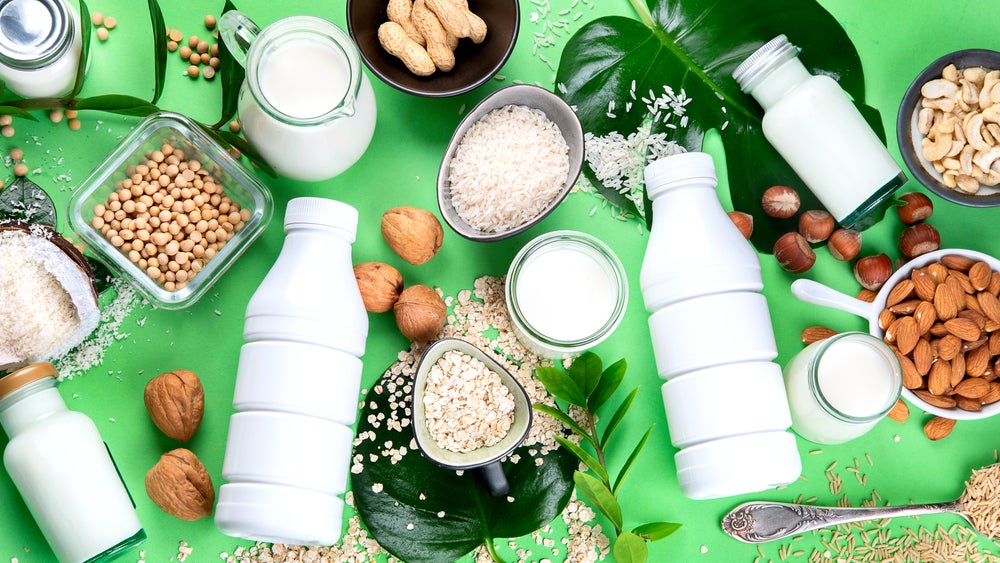
According to new draft guidance currently in development, plant-based products may have restrictions on using terms such as “cheese” or “yoghurt” to describe themselves.
The guidance aims to assist trading standards officers in interpreting and enforcing laws governing the labelling and marketing of dairy alternatives.
Documents obtained by Unearthed reveal that the dairy industry has been advocating for stricter enforcement of these regulations for several years.
Ban on “Milk” extended to “Cheese” and “Yoghurt”
While plant-based products are already prohibited from using the term “milk” to describe themselves, an early draft of the guidance from February 2022 suggests that this restriction could be expanded to include terms like “cheese” and “yoghurt,” even if accompanied by “vegan” or “plant-based” qualifiers.
The draft proposes banning descriptors such as “yoghurt-style” or “cheddar-type,” as well as homophones or misspellings like “mylk.” Additionally, plant-based products may be prohibited from stating that they are “not milk” or positioning themselves as “alternatives” to dairy products.
Enforcement responsibility and industry response
The Department for Environment, Food and Rural Affairs (Defra) has informed plant-based companies that local authorities and trading standards officers are responsible for enforcing dairy labelling and marketing standards.
The guidance is being prepared by the Food Standards Information Group (FSIG), a collection of senior trading standards experts, to support local officials in applying existing laws.
Member of the FSIG, David Pickering, emphasised that they aim to provide a fair and balanced interpretation of the legislation, suggesting that market stakeholders should lobby the government if they disagree with it.
UK’s growing plant-based market and opposition
The UK ranks among the top consumers of plant-based products globally, with plant-based drinks experiencing a 24% sales increase between 2020 and 2022, reaching £276 million and capturing a 7% market share.
Nearly half (48%) of UK consumers consume at least one plant-based milk alternative. Marisa Heath, CEO of the Plant Based Food Alliance UK, expressed concern that the proposed measures would make the UK one of the most restrictive nations regarding labelling regulations.
She argued that consumers are knowledgeable and should be empowered to make their own shopping choices.
Dairy UK’s push for stricter guidelines
Dairy UK, a trade association representing the dairy industry, has advocated for stricter guidelines for plant-based products since at least 2017.
Members of Dairy UK include companies such as Arla Foods, Saputo and Müller. The association raised concerns about the misuse of protected dairy terms and the use of qualifying terms to indicate a product’s dairy-free nature.
Dairy UK submitted a position paper to Defra supporting the FSIG’s draft proposals and urging the government to protect dairy terms.
Stricter than EU and US regulations
If local authorities adopt the strictest interpretations of the draft guidance, the UK would impose stricter regulations compared to both the European Union and the US.
The European Court of Justice ruled in 2017 that plant-based brands are prohibited from using terms like “milk,” “butter” or “cheese.” However, Amendment 171, which could have further restricted vegan product descriptions like “creamy,” was dropped following opposition from the plant-based sector and environmental organisations.
The US Food and Drug Administration allows the use of the term “milk” for plant-based drinks while recommending the disclosure of nutritional differences.
Industry voices and Defra’s response
Various industry voices have criticised the proposed restrictions, arguing that they lack clarity for consumers and hinder their ability to choose dairy alternatives.
Public affairs director of Oatly, Cecilia McAleavey, expressed concern that further restrictions would make it harder for consumers to find dairy alternatives and make informed choices.
Chief executive of Dairy UK, Dr Judith Bryans, stated that the draft guidance aims to clarify labelling and marketing practices and minimise consumer confusion. She emphasised the nutrient richness of dairy foods and their irreplaceable role in a balanced diet.
A spokesperson from Defra responded to the claims, stating that the power to enforce dairy marketing and labelling laws lies with local authorities and Defra has not exerted any influence in this matter.
If implemented, stricter regulations in the UK would go beyond the existing restrictions in the EU and the US. While the European Court of Justice has banned terms like “milk” and “cheese” for plant-based products, Amendment 171, which could have introduced further restrictions, was abandoned.
The debate over the proposed guidance reflects the growing popularity of plant-based products in the UK and the concerns of both the dairy and plant-based sectors regarding fair labelling practices and consumer choice.
The final version of the guidance will determine how plant-based products can be marketed and described and it remains to be seen how local authorities will enforce the regulations once they are in place.




